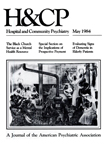The Effect of Hospital Payment Methods on the Pattern and Cost of Mental Health Care
Abstract
The authors report on a study of the impact of a prospective pay-ment method on hospital charges and mix of services provided to a group of Medicare patients treated for mental disorders in general acute care hospitals in Maryland. The study focused on per case reimbursement, under which hospitals are guaranteed a level of total revenue based on the number and case mix of discharges, and examined its effect on hospital charges during an index admission and on hospital and nonhospital charges over a three month period following the index admission. The results suggest that per case reimbursement provides incentives to reduce the cost of one hospital stay, but this cost reduction is possibly offset by a higher readmission rate or by higher readmission charges. The authors conclude that the impact of the per case payment method on the total cost of mental health care over a specific period of time is insignificant, but that the payment method may influence the pattern of care.
Access content
To read the fulltext, please use one of the options below to sign in or purchase access.- Personal login
- Institutional Login
- Sign in via OpenAthens
- Register for access
-
Please login/register if you wish to pair your device and check access availability.
Not a subscriber?
PsychiatryOnline subscription options offer access to the DSM-5 library, books, journals, CME, and patient resources. This all-in-one virtual library provides psychiatrists and mental health professionals with key resources for diagnosis, treatment, research, and professional development.
Need more help? PsychiatryOnline Customer Service may be reached by emailing [email protected] or by calling 800-368-5777 (in the U.S.) or 703-907-7322 (outside the U.S.).



